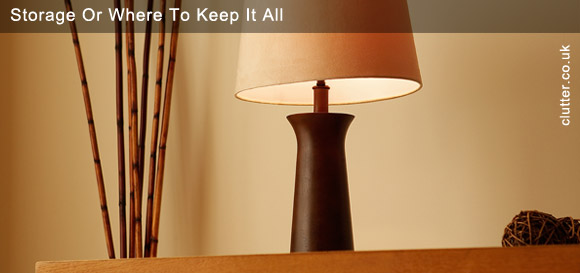 Many de-cluttering books and articles seem to focus more on organising your clutter than in disposing of it. If you need a very complicated system in order to organise your belongings then I suggest that you have too many belongings!
Many de-cluttering books and articles seem to focus more on organising your clutter than in disposing of it. If you need a very complicated system in order to organise your belongings then I suggest that you have too many belongings!
Once you’ve de-cluttered properly so that you only own the items you use and love, then storage should be relatively simple. However I can give some tips that will help to keep you organised.
Tip One – Keep Things Where You Use Them
Store items as close as possible to the location in which you will use them. If you keep your clean towels in the bedroom then you will undoubtedly forget to take one in with you at some point. You will then emerge dripping from your shower and the bedroom will seem an awfully long way away!
Where possible keep towels and spare toilet rolls in the bathroom, keep dish cloths in the kitchen, laundry powder near the washing machine, DVD’s near the player… well you get the idea.
Tip Two – Repackage To Save Space
Two half full boxes take up a lot more space than one full one. Reorganise and repackage your belongings to take up less room. For example, we tend to keep the box our mobile phone came in because it has the guide as well as various accessories in there. However the box is often much bigger than it needs to be. If you have more than one of these boxes lying around then take each set of instructions and accessories and put them in a clear plastic bag; seal them up and label them with the make and model of phone. You can then keep them all in just one box, throw away the other boxes and free up a lot of space.
Tip Three – Buy Furniture With Storage
When buying a new piece of furniture always try and get some storage included. For example buy a wooden trunk rather than a coffee table, have drawers in your divan, and have a chest of drawers rather than a table beside your bed. You will then have more storage without using up any extra floor space.
Tip Four – Built-In Is Best
Built-in storage can make use of small or awkward spaces that would be impossible to buy storage for. Get a carpenter to come in and build you a cupboard or some shelves in spaces under stairs, alcoves and any other likely spaces. Rooms in the roof are particularly hard to buy storage for and you will make much better use of the space with built-in cupboards, desks and shelves. You won’t lose any floor space to speak of, but will gain a lot of storage for your possessions.
Tip Five – Hide It All Away
I’m not a fan of glass fronted cupboards or open shelving. Items tend to flop around and look disorganised on open shelves, whilst glass doors reveal all the clutter within. When your belongings are hidden away behind a door or screen you will achieve a much more uncluttered look. If you can’t remember which items are in which cupboards then you probably have too much stuff!
Tip Six – Think Tall
Tall and thin storage will take up less space in a small home. Floor space is at a premium but there is always plenty of wasted space up above. Buy tall, slim bookcases, cupboards and wardrobes and you will be able to squeeze a lot more storage in.
Tip Seven – Make Use of Attics
If your loft or attic is inaccessible then try to make better use of it. Have a pull-down ladder installed and the opening made larger if it’s too small. If you’re worried about falling through the ceiling below, then get the floor boarded over and a light put in so that it’s easier and safer to store things there and to access what you have.
Tip Eight – Consider What You’re Storing
Think about which items you need to accommodate when buying storage. Don’t buy open shelving if you have a miscellany of little of objects as they will scatter around and look messy. Don’t buy lots of little boxes if you need to store mainly large items. Any old storage won’t necessarily suit your purpose but instead it needs to be tailored to your particular needs.
Tip Nine – Don’t Store Things Elsewhere
Don’t rent a storage locker or keep possessions at your parents’ or friends’ houses, unless you are a student or living in temporary accommodation. If you don’t have room for all your belongings in your own home then you have too many belongings and should de-clutter. It’s not fair to other people to make them put up with your clutter as well as their own.
Tip Ten – Review and Assess Regularly
Our needs and lifestyles change over time and you may find that what was once useful is useful no longer. Go through your cupboards now and again and assess whether you use the items they contains. If you can make some space in your current storage then you won’t need to keep buying or building more. After all, storage itself can become clutter if it’s full of clutter.
Even a house that isn’t cluttered needs storage to keep all the things you do use and love. You will never achieve an uncluttered look without it and I would rather have too much storage than not enough. But don’t be tempted to fill up space just because you have it. There’s nothing wrong with an empty cupboard, drawer or shelf. See the empty space as a wonderful luxury and proof that you don’t have any clutter.


